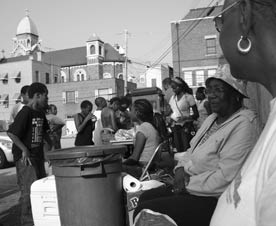Milwaukee — a small metropolis with the issues of a big city. One of the most segregated places in the country, with more bars per capita than New York or Los Angeles. Daily reports in the evening news tell of homicides and violence from sections of the city where hardworking, tax-paying adults, and their families live. According to the Wisconsin State Journal, it is the largest city in a state with more black men in prison than anywhere else in America — a community organizer’s dream, or nightmare, depending on your perspective.
Here, Safe & Sound’s Community Partners walk the streets in packs of as many as 10 and teams as small as two. Knocking on doors in some of the roughest gang-infested neighborhoods in Milwaukee’s inner city, they talk to residents about crime, form block-watch groups, and work with residents to report nuisance properties — buildings or homes where the residents or landlord have introduced a criminal element to the community. Some residents greet them with salutations usually reserved for close friends and relatives; others whisper, even shout, to warn of their appearance on “the block.”
We had just crossed Center Street and were approaching the next block when a young African-American woman announced our arrival to a group of young men refurbishing the inside of a house. “It’s gonna be one of those days,” I thought to myself. A colleague standing directly in front of me turned and laughed, calming the situation with a touch of humor. “She must be talking about us.” As one of the two black men walking alongside three white women in a predominantly black neighborhood,while several other black comrades slowly caught up with the group, I was struck again by the courage that the men and women of Milwaukee’s Community Partners organization demonstrate on a daily basis.
As the newest member of Community Partners, I have been on the receiving end of both kinds of receptions as I walk down these blocks, clipboard in hand. Streets like 2nd and Center, where Raheim Patrick was jumped and killed by a group of young men while waiting at the bus stop, or 17th and Brown, where Charles White was brutally beaten to death by children wielding snow shovels.
If you’ve never heard of these streets or the incidents that made them infamous, then you may not fully comprehend the value of the Community Partners. They are on the frontlines. They know these neighborhoods well. If a young boy dies, a crew of young hustlers is causing a ruckus on a nearby corner, or there is a delinquent landlord on your block, they address it. If there was a shooting last week, they go to that block and talk to the people who had to hide on their living-room floor.
Community Partners is a part of the Safe and Sound organization, an initiative established in 1998 to reduce crime, especially violent crime, in high-crime, generally low-income neighborhoods through public-private partnerships. Safe and Sound uses a three-pronged approach of community organizing, law enforcement, and anti-crime youth development. As the community-organizing component of Safe & Sound, Community Partners is integral in all of the approaches and focuses on lowering the rate of youth crime and violence in the Milwaukee area. “It is a unique approach to fighting crime, violence, illegal alcohol, drug selling, and other neighborhood problems.” At least that is the way the organization’s brochure describes it. For me, it has been nothing short of an awakening, both as a young black man with a limited understanding of city politics and as an urban resident of nearly 30 years who thought he knew a little about the city in which he was raised.
I recently started working for Community Partners through Public Allies, an AmeriCorps-funded organization. Public Allies acts as a nonprofit apprenticeship program, placing young community advocates with nonprofits in various cities around the country. I am one of two Public Allies placed at Community Partners; the other is a bright-eyed 23-year-old woman named Julie Knorowski. It was through the Public Allies placement process that I got an interview with Joe Kubiask, the program manager of Community Partners. I remember immediately being struck by the mild-mannered, yet extremely passionate nature of the man who would decide whether to employ me for the next 10 months (the term of service for the Public Allies/AmeriCorps program).
Joe had been a Peace Corps volunteer from 1997-2000. It had taken him places I had only seen on the National Geographic Channel. During the interview, I thought, “I don’t know if I am cut out for this job.” My apprehension was rooted primarily in the feeling that I had been out of the game too long; I hadn’t really been working in the community since my college years. For seven years, I have managed my own entertainment booking and management agency. After endless nights in bars, nightclubs, and on the road with bands, I felt disconnected from my community, and I wanted to feel connected again. So I shook Joe’s hand and accepted the position. I figured I could work a “nine to five” while managing my small business at night and on the weekends.





Comments